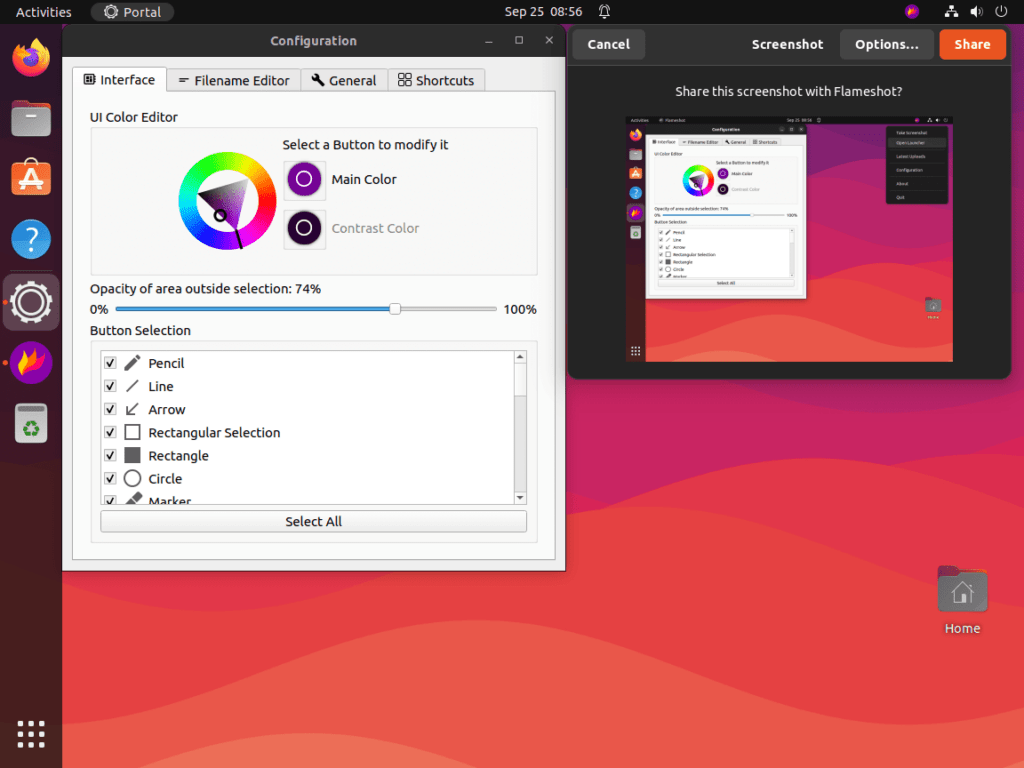Flameshot is a versatile screenshot tool designed for Linux systems. Its intuitive interface offers extensive customization and editing features. Unlike traditional screenshot tools, Flameshot has robust functionalities that cater to a wide range of user needs, from basic screenshot capture to advanced image editing and annotation capabilities.
Here’s why Flameshot is highly regarded:
- Ease of Use: Simple, user-friendly interface allowing quick access to its features.
- Powerful Annotation Tools: Includes arrows, lines, text, and shapes to highlight or explain parts of your screenshot.
- Customization Options: Customize color, size, and even the blur effect for sensitive information.
- Flexible Capture Options: Choose from full-screen, window, or custom area captures.
- In-App Editing: Edit screenshots immediately after capture without needing an external editor.
- Screenshot Sharing: Easily share your screenshots through various platforms with minimal steps.
- Command-Line Support: Offers command-line options for automation and integration with other tools.
- Cross-Distribution Support: Available on multiple Linux distributions, ensuring wide accessibility.
Transitioning from a snapshot of Flameshot’s capabilities to applying these in practice, the following steps will guide you through a seamless installation process.
Method 1: Install Flameshot via APT
Update Ubuntu Packages Before Flameshot Installation
Before proceeding with the tutorial, ensuring your system is up-to-date with all existing packages is good.
sudo apt updateProceed to upgrade any outdated packages using the following command.
sudo apt upgradeInstall Flameshot via APT Command
Flameshot is available in Ubuntu’s standard repository by default. This is the best option for most users who prefer not to use a third-party package manager.
sudo apt install flameshotMethod 2: Install Flameshot via Flatpak and Flathub
The second option involves using the Flatpak package manager. While Ubuntu doesn’t natively include Flatpak because Canonical supports both Ubuntu and Snaps, you can install it from the repository.
Enable Flathub for Flameshot
Next, you must enable Flatpack using the following command in your terminal.
sudo flatpak remote-add --if-not-exists flathub https://flathub.org/repo/flathub.flatpakrepoInstall Flameshot on Ubuntu via Flatpak Command
Next, you can install Flameshot Flatpak using the following command:
flatpak install flathub org.flameshot.Flameshot -yMethod 3: Install Flameshot via Snap
The third method to get Flameshot on Ubuntu is through Snapcraft. While Snapcraft might not be as widely recognized as Flatpak in the broader Linux community, it remains efficient on Ubuntu, especially with Canonical advocating for increased Snap usage.
Verify Snap is Installed on Ubuntu for Flameshot Installation
To deploy Flameshot using Snapcraft, initiate by installing the Snap Manager. If you had previously uninstalled it, reinstall it using the command:
sudo apt install snapd -ySubsequently, set up the core files for SNAP to prevent potential complications:
sudo snap install coreInstall Flameshot on Ubuntu via Snap Command
Conclusively, install Flameshot with the command:
sudo snap install flameshotLaunch Flameshot via CLI Commands or GUI Path
CLI Commands to Launch Flameshot
With Flameshot installed, you can launch the software immediately using the command terminal.
flameshotflatpak run org.flameshot.Flameshotsnap run flameshotGUI Path to Launch Flameshot
Ubuntu desktop users often prefer using the application icon, which you can pin to your sidebar. You can find the application icon at the following path:
Activites > Show Applications > Flameshot

Flameshot CLI Command Examples
Below are some basic CLI commands you can use with Flameshot for users who prefer using terminal actions over GUI methods.
Common Example Commands For Flameshot
capture with GUI:
flameshot guiCapture with GUI with custom save path:
flameshot gui --path ~/myStuff/capturesOpen GUI with a delay of 3 seconds:
flameshot gui --delay 3000Fullscreen capture (asking to save path):
flameshot fullFullscreen capture with custom save path (no GUI) and delayed:
flameshot full --path ~/myStuff/captures --delay 5000Capture fullscreen with custom save path copying to clipboard:
flameshot full --clipboard --path ~/myStuff/capturesCLI Configuration Commands For Flameshot
Open the configuration menu:
flameshot configShow the initial help message in the capture mode:
flameshot config --showhelp trueTo check mistakes and issues in the configuration file:
flameshot config --checkFor more information about the available options, use the help flag:
flameshot config --helpAdditional Flameshot Commands
Update Flameshot
To keep Flameshot up-to-date, it is often recommended to check routinely for updates using the cli command terminal; this way, you are sure your system is up to date.
APT Update Command For Flameshot
sudo apt update && sudo apt upgradeFlatpak Update Command For Flameshot
flatpak updateSnap Update Command For Flameshot
snap refreshRemove Flameshot
The removal of the Flameshot is straightforward. Use the following command to match your installation.
APT Remove Command For Flameshot
sudo apt remove flameshotFlatpak Remove Command For Flameshot
To remove the Flatpack version, run the following command.
flatpak uninstall --delete-data org.flameshot.Flameshot -ySnap Remove Commands For Flameshot
sudo snap remove flameshotConclusion
Throughout this guide, we’ve covered three different methods for installing Flameshot on Ubuntu versions 24.04, 22.04, and 20.04 LTS, diving into first-time user tips, customization tricks, and handy keyboard shortcuts to enhance your screenshot experience. Remember to explore Flameshot’s rich features and integrate them into your daily tasks for better productivity. Happy screenshotting!
Useful Links
Here are some valuable links related to using Flameshot:
- Flameshot Official Website: Visit the official Flameshot website for information about the screenshot tool, its features, and download options.
- Flameshot Documentation: Access comprehensive documentation for detailed guides on installing, configuring, and using Flameshot.


Thanks for sharing your knowledge about flameshot. For me it is essential in my Ubuntu installation.
Thanks Paco for the feedback.